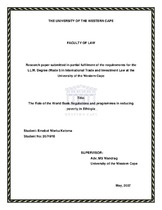| dc.description.abstract | Despite some gains in economic reforms and international commitments, Ethiopia still maintains the position of one of the poorest countries in the world in the 21st century with very little power to influence the allocation of resources in the world market. The development problems in many of the sub-Saharan regions are confined within the country including the difficulty to keep up with rapid increase in the number of primary school enrollments, which has led to a situation of compromised quality; high child mortality and HIV/AIDS, which poses additional challenges to the poor health facilities, gender and regional inequalities and sustainable debt burden. Making matters worse, Ethiopia's political instability, civil war, recurring of drought, and economic mismanagement ties the country to a severe poverty cycle.. Ethiopia has made important economic, social and political reforms with the support of the World bank and other multilateral institutions, to pave the way for the country to face the challenges posed by globalization. However, these reforms have not been sustained by effective implementation. The response to overcome the problems has also been slow to see rapid growth. In this research paper, the writer explores the challenges regarding Ethiopia's poverty from perspective of the World Bank. The research examines the theoretical and conceptual underpinning of the World Bank's general mandate and objectives on poverty reduction, using Ethiopia as a case study. | en_US |

